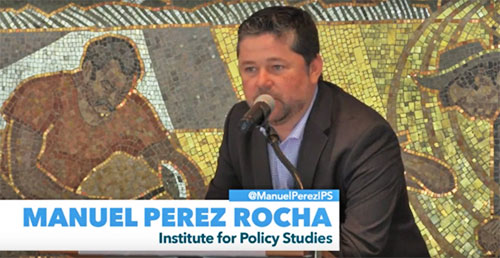|
from IPS-DC Website
and the Trans-Pacific Partnership will only accelerate a race to the bottom for families in the Northern triangle of Latin America, Manuel Perez-Rocha said at the AFL-CIO conference
on U.S. trade policy.
U.S. trade negotiators continue to claim that free trade agreements help to support security, but in reality, they exacerbate the root causes of instability in the Mesoamerican region, IPS's Manuel Perez-Rocha said in a speech at the AFL-CIO conference on U.S. trade policy.
Today the Northern triangle of Latin America is one of the most dangerous places in the world.
In Mexico alone, there are more than 27,000 people reported missing on top of the 100,000 killed in the so-called war on drugs, Perez-Rocha said.
He explained that the origins of this crisis are rooted in structural adjustment policies that the IMF and the World Bank imposed on Central America to pave the way for free trade agreements like,
Perez-Rocha said the abandonment of national production of food to favor imports, brought on by NAFTA, has meant the fall of production, employment, and income and the increase of inequality, poverty, and migration.
He said this abandonment of the countryside by the government propelled the vacuum that has become occupied by organized crime.
Ten years later, CAFTA was imposed in Central America, ushering in what Perez-Rocha called,
Perez-Rocha offered one of the most egregious examples in the case of the Pacific Rim mining company which is demanding millions of dollars from El Salvador for protecting its environment.
He quoted U.S. Vice President Biden as saying,
However, the proposal in the Alliance for Prosperity Plan does not address the roots of the crisis, Perez-Rocha said.
The alliance and agreements like the TPP, on top of the destruction already brought on by NAFTA and CAFTA, will only mean an acceleration of the race to the bottom for the region's working families, further dislocation and displacement, and regional insecurity, he said...
|


